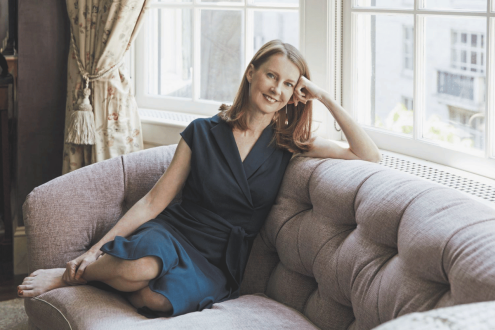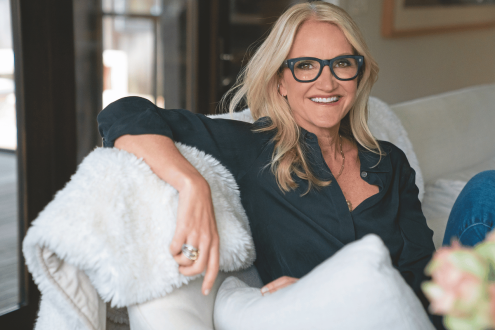What will you leave behind?
Have you ever thought about what your legacy will be? Eleanor Tucker tries out a new method of leaving memories behind for her loved ones – and discovers some things about herself along the way…

5 minute read
The other day I told my five-year-old son a story, which was probably largely inaccurate, about how my father accidentally wounded his commanding officer in the ear when he was doing National Service. Or was it the nose? Anyway, it had earned him a nickname, along with the wrath of the sergeant major in question.
Jake was fascinated – and I was annoyed I didn’t know the story better, and couldn’t even remember the nickname. I vowed to ask my aunt, but then forgot. And I couldn’t ask my father, because he died a couple of years ago. Maybe that story, that little part of his life, will be forgotten soon. It was such a small thing, but it made me sad that I couldn’t pass it on properly to my son.
It was this impulse that caused charity CEO Kate Gross, knowing she was dying of cancer, to pen Late Fragments, a book about her life primarily intended for her five-year-old sons to read when they are older.
It got me thinking. In this internet age, when many of us record the minutiae of our daily lives via social media, and when we don’t necessarily have time to write a whole book, how can we lay down something more concrete than an Instagram of yesterday morning’s skinny latte – something that will serve as our legacy after we’ve gone?
I’d love to be able to show Jake a film of his grandpa telling that tale. Maybe Jake will feel the same way when it comes to telling his children about me (though I don’t recall ever injuring a boss…). So I set about discovering how this could be done. One way would be to record yourself telling stories, then save the film for posterity. Fine – except who actually does that? And would you even know what sort of things to say?
Joanna Helin, founder of LifeStoryBank, doesn’t think that many people would know what to say. After losing a relative herself, she decided to create an online space – a kind of ‘life memory box’ where site users can record themselves talking about their lives, through a series of interview-style questions from an avatar. The questions have been carefully researched, so the idea is that you’ll be prompted to share not just whatever pops into your head, but things that your descendants would be likely to be interested in. And not just your children – descendants living long after them who will never know you ‘in real life’. Quite a thought.
Storing your story
The theory sounds great. But what’s the reality like? Why would a busy, healthy woman want to spend a few hours talking to her laptop about the names of her primary school PE teachers or what her first boss was like? I wasn’t sure, but I was strangely drawn to the idea.
The first thing I had to get over was watching myself on screen. I’ve never really liked seeing myself on screen (stop frowning, woman!) or hearing my voice recorded (it doesn’t sound that nasal in my head). But the focus is to enjoy the experience, so I tried to keep this in my mind as I repeatedly put off getting started.
There are about 30 sections, from ‘Getting To Know You’ and ‘Views and Opinions’ to more specific areas like ‘Growing Up’, ‘Trips and Holidays’ and ‘Stories About Your Children’. Each section is divided into questions, which your avatar (‘Ava’) asks you. Then you record your answer, edit if you want, save it and move on. You don’t have to answer all the questions – you can pick and choose. And although you can talk for up to five minutes for each answer, you don’t have to use all the time.
I dived in to ‘Getting To Know You’. ‘What are you best at?’ Ava asked me. I was thrown. I felt like I was in an interview, trying to sell myself. I must have re-recorded my answer three times, trying to shake off the feeling that I was doing this to land a job. ‘Being a mum,’ I mumbled, looking around the room. ‘Writing?’ I offered, self-consciously. Why was I asking my laptop?
Doing myself justice
It was time to stop and think about what I was doing – and why. I made myself imagine that, for some reason, I was going to die tomorrow and wanted to record my legacy. I know this sounds morbid, but by contemplating your own death, even if you’re not dying, are you not doing something that is, in fact, the opposite of morbid – something life-affirming? Thinking about how I would want to be remembered if I wasn’t around, I suddenly felt an urge to stop mumbling awkwardly at my webcam and to do myself justice – to leave the people who love me something worth watching.
So, I blubbed and laughed my way though three hours of recording, without a hint of self-consciousness. Why would the Jake of the future care about my frown lines? He would want to hear funny stories about family holidays I went on as a child. Why would my daughter Phoebe, when she’s 25 years old, care about my (possibly) nasal voice? She’d probably be more interested in my advice on relationships (yes, you get to leave pearls of wisdom as well as memories).
Keep making memories
Naturally, we avoid thinking about the fact that some time in the future, we’re not going to be here. And although doing something like LifeStoryBank is a practical way of leaving a legacy, it’s more than that. By putting thought into what kind of memory box I’m leaving behind, I’ve felt more mindful of the fact that I am still making memories. We can easily get caught up in the admin of daily life: the online shopping order; the school run; the car insurance renewal. Yet, amid all this, every day is ripe for a memory to be made.
It doesn’t have to be a big one, a life-changer – memories are also made in a detour to the park on the way home from school, in an impromptu coffee break with a friend when you both laugh until your cheeks hurt, or in a last-minute glass of wine with your other half when you have one of those talks that reminds you exactly why you fell in love in the first place.
‘What have been the most significant moments in your life?’ Ava asked me at one point. I answered, the tears dropping onto my keyboard as I started to remember them: meeting my husband, giving birth to my children, even losing my father…
But some of the tears were for something else, too – for how lucky I was to have plenty of significant moments yet to come.
For more information on LifeStoryBank, see lifestorybank.com
Photograph: Steve Prezant/IMAGE SOURCE









